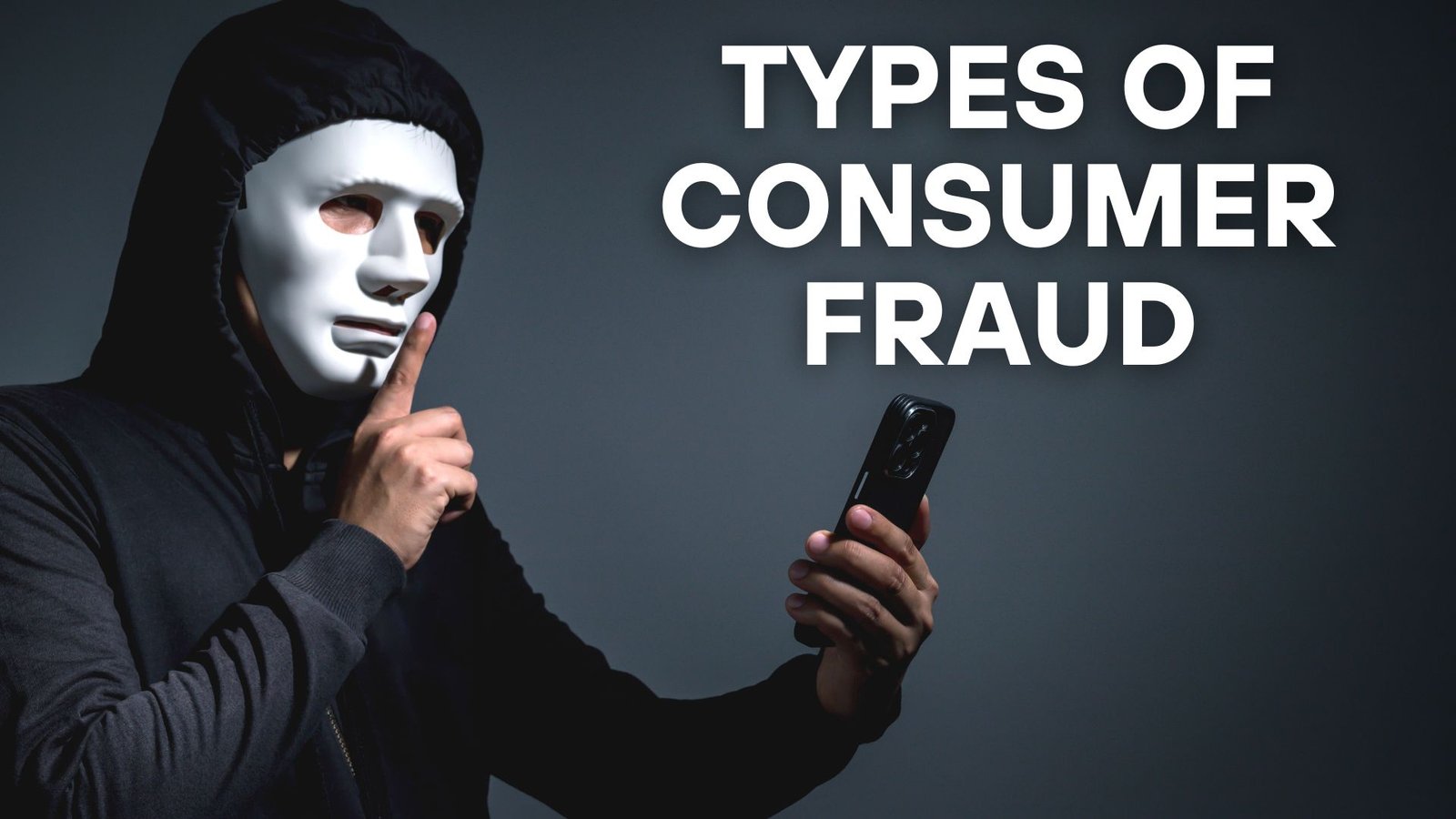On this page you will read detailed information about Types of Consumer Fraud.
As a consumer in today’s digital age, you face an ever-growing array of sophisticated fraud schemes designed to separate you from your hard-earned money. Understanding the various types of consumer fraud is essential to protecting yourself and your finances. From identity theft and phishing scams to fake charities and investment fraud, criminals are constantly devising new ways to exploit unsuspecting victims. By familiarizing yourself with common fraud tactics, you’ll be better equipped to recognize red flags and avoid falling prey to scams. This article will examine several prevalent forms of consumer fraud, empowering you with the knowledge to safeguard your personal and financial information.
What is Consumer Fraud?
Consumer fraud refers to deceptive or misleading practices that cause financial harm to consumers. These fraudulent activities can take many forms, exploiting unsuspecting individuals through various schemes. According to the FBI, consumer fraud often involves false advertising, bait-and-switch tactics, and fraudulent debt collection practices.
Common Types of Consumer Fraud
The landscape of consumer fraud is diverse, with scammers constantly devising new methods to deceive. Some of the most prevalent types of consumer fraud include:
- Identity theft: Criminals steal personal information to commit fraud in the victim’s name.
- Credit and debit card fraud: Unauthorized use of card information for purchases or cash withdrawals.
- Advance fee scams: Victims pay upfront fees for promised services or deals that never materialize.
- Phishing scams: Attempts to obtain personal or financial information through deceptive emails or websites.
Impact and Prevention
Consumer fraud can have severe consequences, including financial losses, damaged credit, and emotional distress. To protect yourself, it’s crucial to stay informed about the latest fraud trends and be cautious when sharing personal information, especially online. Regularly monitoring your financial accounts and verifying the legitimacy of companies before engaging with them are essential preventive measures.
If you suspect you’ve fallen victim to consumer fraud, report it promptly to law enforcement and relevant consumer protection agencies. By staying vigilant and informed, you can significantly reduce your risk of becoming a target of these deceptive practices.
Types of Consumer Fraud
Consumer fraud comes in many forms, each designed to deceive and exploit unsuspecting individuals. Understanding these various types of consumer fraud is crucial for protecting yourself and your finances.
Identity Theft and Financial Fraud
One of the most prevalent types of consumer fraud is identity theft. This occurs when someone steals your personal information, such as your name, Social Security number, or credit card details, to commit fraudulent activities. Criminals may use this information to open new accounts, make unauthorized purchases, or even file false tax returns in your name.
Another common form is financial fraud, which includes credit and debit card fraud. This can happen when your card information is stolen and used for unauthorized transactions. Be vigilant for unfamiliar charges or significant drops in your account balance.
Scams and Deceptive Practices
Advance fee fraud is a widespread scam where fraudsters promise money, products, or services in exchange for an upfront fee. Victims pay but never receive the promised benefits.
Phishing scams use fake emails or websites to trick you into revealing personal information. These scams often mimic legitimate companies to gain your trust.
Marketplace and Consumer Product Fraud
Unfair and deceptive practices in the marketplace include companies failing to be transparent about their business practices or pricing. This can also extend to selling unsafe or defective products to consumers.
To protect yourself from these various types of consumer fraud, stay informed about current scams, be cautious with your personal information, and verify the legitimacy of offers before engaging. If you suspect fraud, report it promptly to the relevant authorities.
In the previous post, we had shared information about The Maximum Retail Price Act, 2014, so read that post also.
Bait and Switch Fraud
Understanding the Deceptive Tactic
Bait and switch fraud is one of the most common types of consumer fraud that can catch unsuspecting shoppers off guard. This deceptive practice involves advertising an attractive product or service at a low price, only to then convince customers to purchase a different, often more expensive item. The “bait” lures potential buyers in, while the “switch” redirects them to a product that’s more profitable for the seller.
How It Works
Retailers employing this tactic may use various methods to execute the switch:
- Claiming the advertised item is out of stock
- Stating that the last unit has been sold
- Suggesting the product is flawed or damaged
The success of this scam heavily relies on the salesperson’s ability to steer customers away from the advertised product and towards the desired merchandise.
Protecting Yourself
To avoid falling victim to bait and switch tactics, consider these precautions:
- Be wary of deals that seem too good to be true
- Ask detailed questions about the advertised product
- Get offers in writing
- Trust your instincts if something feels off
Remember, while bait and switch practices are considered a form of retail sales fraud, proving such cases legally can be challenging. Stay vigilant and informed to protect yourself from these deceptive strategies.
Identity Theft and Account Fraud
Identity theft and account fraud are two of the most pervasive types of consumer fraud in today’s digital age. These crimes can have devastating consequences for victims, affecting their financial well-being and personal lives.
Understanding Identity Theft
Identity theft occurs when someone uses your personal information without your permission to commit fraud or other crimes. According to the Federal Trade Commission, thieves may use your name, Social Security number, or credit card details to assume your identity. This can lead to unauthorized purchases, new account openings, and severe damage to your credit score.
Recognizing Account Fraud
Account fraud often goes hand-in-hand with identity theft. Criminals may gain access to your existing accounts or create new ones in your name. Signs of account fraud include unexpected withdrawals from your bank accounts, missing bills or statements, and unfamiliar accounts appearing on your credit report.
Protecting Yourself
To guard against these types of consumer fraud, it’s crucial to:
- Monitor your accounts regularly
- Place fraud alerts with credit bureaus
- Report any suspicious activity immediately
- Be cautious about sharing personal information online or over the phone
By staying vigilant and taking proactive steps, you can significantly reduce your risk of falling victim to identity theft and account fraud.
Prize and Sweepstake Fraud
Prize and sweepstake fraud is one of the most common types of consumer fraud, often targeting vulnerable individuals, especially older adults. These scams typically involve notifications claiming you’ve won a large sum of money or a valuable prize, but require you to pay fees or taxes upfront to claim your winnings.
Red Flags to Watch For
Be wary of any unsolicited win notifications that pressure you to act quickly or demand upfront payments. Legitimate sweepstakes will never ask you to pay fees or taxes to receive a prize. Other warning signs include:
- Being asked to provide sensitive financial information
- Receiving notifications via bulk mail
- Being required to attend a sales meeting to claim the prize
- Not remembering entering the contest or sweepstake
Protecting Yourself
To guard against prize and sweepstake fraud, always verify the legitimacy of any offer before taking action. Research the company or organization and contact them directly using their publicly available information, not the details provided in the prize notification.
Never share credit card or bank account numbers, and don’t send money, even if a check is provided (which is likely fraudulent). Remember, if it sounds too good to be true, it probably is.
If you suspect you’ve been targeted by a scam, report it to the Federal Trade Commission (FTC) and your state’s consumer protection office. By staying vigilant and informed, you can help protect yourself and others from falling victim to these deceptive practices.
Conclusion
As you navigate today’s complex marketplace, remain vigilant against the myriad forms of consumer fraud. By understanding common schemes like identity theft, phishing, and investment scams, you can better protect yourself and your finances. Stay informed about emerging threats and practice good cybersecurity habits. Remember to scrutinize offers that seem too good to be true, guard your personal information carefully, and report any suspected fraud to the proper authorities. With awareness and caution, you can significantly reduce your risk of falling victim to these deceptive practices. Ultimately, an educated consumer is the best defense against the ever-evolving landscape of consumer fraud.
Disclaimer
The information and services on this website are not intended to and shall not be used as legal advice. You should consult a Legal Professional for any legal or solicited advice. While we have good faith and our own independent research to every information listed on the website and do our best to ensure that the data provided is accurate. However, we do not guarantee the information provided is accurate and make no representation or warranty of any kind, express or implied, regarding the accuracy, adequacy, validity, reliability, availability, or completeness of any information on the Site. UNDER NO CIRCUMSTANCES SHALL WE HAVE ANY LIABILITY TO YOU FOR ANY LOSS OR DAMAGE OF ANY KIND INCURRED AS A RESULT OR RELIANCE ON ANY INFORMATION PROVIDED ON THE SITE. YOUR USE OF THE SITE AND YOUR RELIANCE ON ANY INFORMATION ON THE SITE IS SOLELY AT YOUR OWN RISK. Comments on this website are the sole responsibility of their writers so the accuracy, completeness, veracity, honesty, factuality and politeness of comments are not guaranteed.
So friends, today we talked about Types of Consumer Fraud, hope you liked our post.
If you liked the information about Types of Consumer Fraud, then definitely share this article with your friends.








